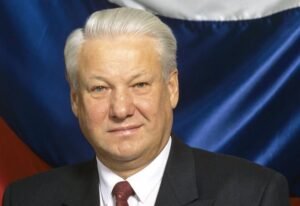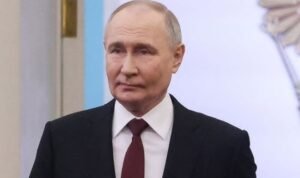This is a list of all Presidents of Russia from 1991 till date, which includes their terms In office, and political affiliations:
President | Term Start | Term End | Party |
|---|---|---|---|
Boris Yeltsin | 1991 | 1999 | Independent (Initially Democratic Russia) |
Vladimir Putin | 1999 | 2008 | Independent (Later United Russia) |
Dmitry Medvedev | 2008 | 2012 | United Russia |
Vladimir Putin | 2012 | Present | Independent |
READ ALSO: List Of All Presidents Of Finland (1919-Present)
Who Was The 1st President Of Russia?

Boris Nikolayevich Yeltsin was the first President of Russia. He was born on February 1, 1931, in a place called Sverdlovsk, which is now known as Yekaterinburg, in Russia.
Yeltsin was a popular Soviet and Russian politician whose career in politics lasted many years. He became President from 1991 to 1999.
Yeltsin’s early career started in the construction industry, having finished his studies at the Urals Polytechnic Institute in 1955.
In 1961, he joined the Communist Party of the Soviet Union, and he moved up the ranks. By 1976, he became the First Secretary of the Sverdlovsk Oblast committee.
During the early years of his political career, Yeltsin supported the reforms of Mikhail Gorbachev. Gorbachev’s reforms, known as perestroika, aimed to change the Soviet economy and political system.
However, Yeltsin soon became critical of Gorbachev’s methods. He wanted more radical changes and pushed for a multi-party system. In 1990, Yeltsin was elected Chairman of the Russian Supreme Soviet.
On June 12, 1991, he made history by becoming the first popularly elected President of the Russian Soviet Federative Socialist Republic (RSFSR).
He won more than 50% of the votes in the first round of the election. This was a notable event in Russian history because it was the first time a leader was chosen through a democratic election, not by party appointment.
However, Yeltsin’s time as President was full of challenges. He played a part in the dissolution of the Soviet Union in December 1991, which led to the creation of the Russian Federation as an independent country.
His administration faced many problems, including economic crises, hyperinflation, and the war in Chechnya that started in 1994.
Despite these issues, Yeltsin is credited with starting major economic reforms to move Russia from a state-controlled economy to a market-based one. On December 31, 1999, Yeltsin unexpectedly resigned, allowing Vladimir Putin to become President.
READ ALSO: List Of All Prime Ministers Of Australia (1901-Present)
Who Is The Current President Of Russia?

The current President of Russia is Vladimir Putin. He has been in top political positions in Russia since 1999, either as president or prime minister.
Putin first became president in 2000, winning the election with about 53% of the vote after Boris Yeltsin resigned. He has been reelected several times and has served continuously, except for a period from 2008 to 2012 when Dmitry Medvedev was president, and Putin was prime minister.
Putin won the 2018 Russian presidential election with more than 76% of the vote, starting his fourth term on May 7, 2018. Recently, he won the 2024 presidential election with 88.48% of the vote, securing his fifth term.
However, many international observers did not consider this election to be fair or free. This was partly due to Putin’s increase in political repressions, especially after starting a full-scale war with Ukraine in 2022.
Before now, Putin worked as an intelligence officer in the KGB during the 1990s and later became the director of the FSB, Russia’s federal security service.
He was appointed prime minister in 1999 and became acting president when Yeltsin resigned at the end of that year. Putin has worked to end corruption and create a strongly regulated market economy.
He has reasserted control over Russia’s regions and reduced the power of wealthy business people known as oligarchs.
Putin also faced significant challenges in Chechnya, a region in Russia that has experienced conflict. During his time as prime minister from 2008 to 2012, while Medvedev was president, Putin was still seen as the main power in the Kremlin.
He was reelected as president in 2012 and again in 2018. His recent victory in the 2024 election, despite being criticized for irregularities, allows him to continue his policies both at home and abroad.

